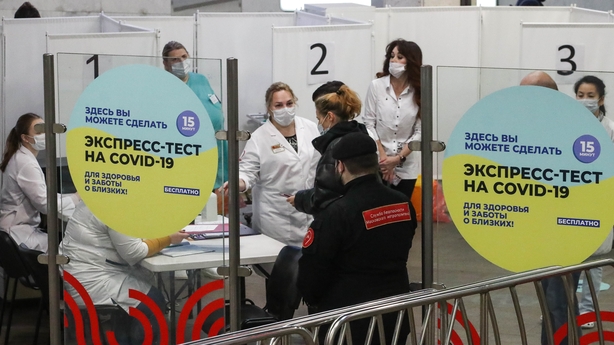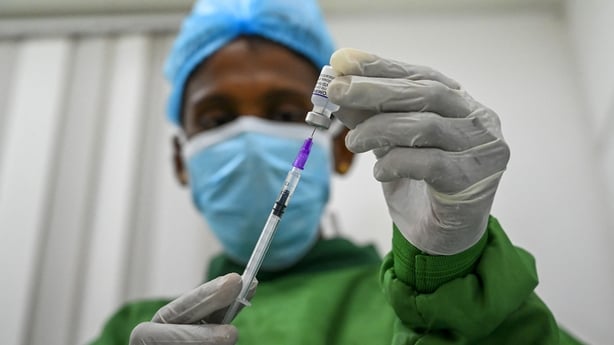Denmark will re-introduce a digital "corona pass" because of a sharp rise in Covid-19 infections, Prime Minister Mette Frederiksen has said, less than two months after scrapping controls.
The Epidemic Commission has recommended the government classify the coronavirus as a "socially threatening disease" and reimpose the pass, Ms Frederiksen told journalists.
"The government will follow this recommendation."
Ms Frederiksen acknowledged that the return of the pass would make life more difficult for those who were not vaccinated, but added: "That's how I think it should be."
In Denmark, with a population of 5.8 million, 85.9% of people over the age of 12 have been fully vaccinated.
But at the end of last week, the authorities warned about the risk of hospitals being overwhelmed because of Covid-19, flu and other infectious diseases.
"The health authorities were expecting more people to be infected (by Covid) and hospitalised, but the things have gone faster than expected," Ms Frederiksen added.
The number of new coronavirus cases was higher than 2,000 again today, for the fifth day running. Medical staff are treating 26 people in intensive care.
The health pass will be re-introduced in bars, restaurants and night clubs.
"You can live with the corona-pass," said Ms Frederiksen. "It gives you peace of mind when you go to the cinema or to a concert," she added.
Denmark was a pioneer of the health pass last spring, when the number of new cases was four times lower than it is now.
So far in Denmark, 2,745 people have died of the coronavirus.
Global Covid-19 cases hit 250 million

Global Covid-19 cases have surpassed 250 million as some countries in eastern Europe experience record outbreaks, even as the Delta variant surge eases and many countries resume trade and tourism.
The daily average number of cases has fallen by 36% over the past three months, according to a Reuters analysis, but the virus is still infecting 50 million people every 90 days due to the highly transmissible Delta variant.
By contrast, it took nearly a year to record the first 50 million Covid-19 cases to be reported.
Health experts are optimistic that many nations have put the worst of the pandemic behind them thanks to vaccines and natural exposure, although they caution that colder weather and upcoming holiday gatherings could increase cases.
"We think between now and the end of 2022, this is the point where we get control over this virus... where we can significantly reduce severe disease and death," Maria Van Kerkhove, an epidemiologist leading the World Health Organization, said.
Read more: Latest coronavirus stories
Infections are still rising in 55 out of 240 countries, with Russia, Ukraine and Greece at or near record levels of reported cases since the pandemic started, according to a Reuters analysis.
Eastern Europe has among the lowest vaccination rates in the region. More than half of all new infections reported worldwide were from countries in Europe, with a million new infections about every four days, according to the analysis.
Several Russian regions said this week they could impose additional restrictions or extend a workplace shutdown as the country witnesses record deaths due to the disease.
Germany's incidence rate rises to record high
Germany's incidence rate measuring the number of new coronavirus infections per 100,000 people over the last seven days has soared to 201.1, a record since the pandemic erupted more than a year ago.
The figure, published by Germany's Robert Koch Institute, surpasses the last high, which had been 197.6 reached on 22 December 2020.
While many more people in the country have had the jab than at that point last year, vaccination rates have stagnated at under 70%, with officials pleading in the last days for the population to get the jab.
"For the unvaccinated, the risk is high that they will become infected in the coming months," warned RKI chief Lothar Wieler on Wednesday.
In the eastern state of Saxony, where the incidence rate is more than twice the national average at 491.3, unvaccinated people face new restrictions.
Access to indoor dining and other indoor events will be limited to those who are fully vaccinated or can show proof of recovery.
The new rules are the toughest state-wide restrictions in Germany against non-inoculated people. Only children as well as those who cannot receive jabs for medical reasons will be exempt.
The surge in German cases comes with the country in political limbo following September's general election.
The incoming coalition parties, aiming to form a government by early December, have so far ruled out mandatory jabs and said there will be no new lockdowns - at least not for the vaccinated.

World leaders call for greater vaccination
Several world leaders have stressed the need to improve vaccination programmes around the world, particularly in the least wealthy countries.
More than half the world's population has yet to receive a single dose of a Covid-19 vaccine, according to Our World in Data, a figure that drops to less than 5% in low-income countries.
Improving vaccine access will be on the agenda of meetings of the powerful Asia-Pacific trade group APEC, hosted virtually by New Zealand this week.
APEC members, which include Russia, China and the United States, pledged at a special meeting in June to expand sharing and manufacturing of Covid-19 vaccines and lift trade barriers for medicines.
"Together we are continuing to keep supply chains functioning and are supporting trade in critical medical supplies – including testing kits, PPE and now vaccines," New Zealand Prime Minister Jacinda Ardern said.
The WHO and other aid groups last month appealed to leaders of the world's 20 biggest economies to fund a $23.4 billion plan to bring Covid-19 vaccines, tests, and drugs to poorer countries in the next 12 months.

